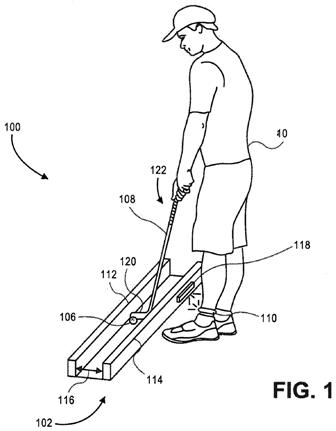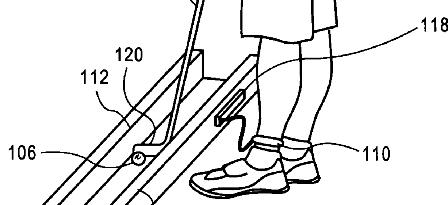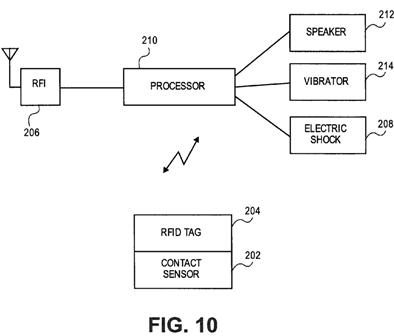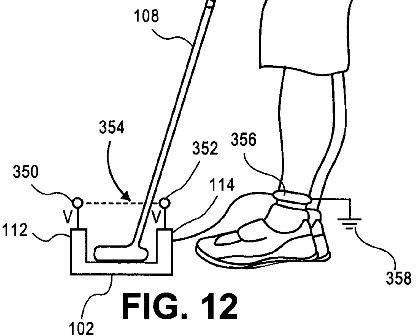I am Pretty Sure Electric Shock Therapy Would Help My Putting Stroke
How much do you love golf? Is it enough to endure a little electric shock therapy to lower your score? I suspect that the answer of most golfers is…. h##l yes!
As a kid I remember loving the game called Operation. It was always such a challenge to remove the wishbone without getting a shock and having buzzers buzzing and lights flashing. Well, the golf putting stroke invention disclosed in recently published application US Pub. No. 20090111598 reminds me a lot of Operation, which makes me think it would be a heck of a fun practice device. Check this out.




The application explains:
[0025] The feedback system 118 provides feedback to the player 104 when the feedback system 118 receives a signal from the detection system 110 indicating an error by the player 104. In one embodiment, the feedback system 118 provides an electric shock. The feedback system 118 may also or alternatively provide feedback that is one or more of a vibration, noise, a visual indicator, and the like as will be described in further detail hereinafter.
[0026] In one embodiment, the amount of feedback may be varied by the user in accordance with their skill level. For example, the intensity and/or time duration may be varied. The feedback and/or detection system may include controls and/or a display, such as, for example, a LCD display to allow a user to adjust the feedback and/or sensitivity of detection. Similarly, in one embodiment, the guide system may be adjusted by the user in accordance with their skill level. For example, the distance 116 between the rails 112, 114 may be adjusted.
[0027] FIG. 2 schematically illustrates another embodiment of a system for improving a golf swing. FIG. 2 illustrates a system in which the feedback system 110 is directly coupled with the detection system 118. For example, in FIG. 2, a wire 124 (or another conductor) is provided between the detection system 118 and the feedback system 110 to electrically couple the detection system 118 and the feedback system 110. It will be appreciated that in embodiments in which a detection system is not provided, one or more wires may directly connect the rails 112, 114 with the feedback system 110.
.
.
.
[0036] FIG. 8 illustrates an exemplary feedback system 118 in accordance with one embodiment of the invention. In one embodiment, the feedback system is a collar 150 that is secured around the player’s leg, wrist, finger, or neck, etc. It will be appreciated that the feedback system need not be a collar. For example, an electrode (or other feedback device) may be fastened or otherwise directly attached to the player. In another example, the feedback system may be provided at the guide system (e.g., loudspeaker at guide system).[0037] The collar 150 may include a buckle 152 to secure the collar 150 to the player. In one embodiment, the collar 150 is adjustable. The collar 150 includes a feedback device 154. For example, in FIG. 8, the feedback device 154 includes an electrode 156 to deliver an electric shock to the player and a speaker 158 to produce an audio noise. It will be appreciated that the collar 156 may include fewer feedback components than illustrated. For example, only an electrode 156 may be provided or only a speaker 158 may be provided. It will be appreciated that alternative feedback devices or combinations of feedback devices may include. Other exemplary feedback devices include a vibration device, such as a vibration motor, a visual device, such as, an LED or LCD, other sound producing devices, other electric shock devices, and the like.
[0038] In FIG. 8, the feedback device 154 also includes controls 160, a power supply 162 and a processor 164. The feedback may also include an RF receiver (not shown). The electrode 156, speaker 158, controls 160 and power supply 162 are electrically coupled to one another through the processor 164. It will be appreciated that, in some embodiments, a processor 164 need not be provided. In one embodiment, the power supply 162 is a low voltage power source such as a 9V battery, three AAA batteries, and the like. In one embodiment, the controls 160 include an intensity dial and/or duration dial to allow a user to adjust an intensity and/or duration of the feedback. In one embodiment, the controls 160 include one or more switches may be provided to select a mode (e.g., shock, vibrate, etc.) and/or turn the feedback system on/off.
[0039] As described above, the feedback provided to the user may be an electric shock. Various combinations of current and voltage may be used to provide the electric shock. Exemplary minimum currents and voltages include, for example, 1 mA, 10V at 10,000 ohms, 1V at 1,000 ohms and a power of 0.01 W. Exemplary maximum currents and voltages include, for example, 5 mA, 50V at 10,000 ohms, 5V at 1,000 ohms and a power of 0.25 W. It will be appreciated that the current and/or voltage used may be any value or range of values between the exemplary minimum and maximum values provided above. It will be appreciated that the current and/or voltage may be less than the exemplary minimum currents and voltages or greater than the exemplary maximum currents and voltages. It will be appreciated that the electric shock should be sufficient that the user feels the electric shock. It will also be appreciated that the electric shock should not be so great to injure the user. The feedback system 118 may include electrodes that directly contact the player or may be separated a distance from the player to avoid direct contact. In one embodiment, the shock provided is of short duration.
I can just imagine one of these in the bar at the clubhouse so you could challenge your buddies to a little putting competition after a few cold ones; especially if you could adjust the voltage to really penalize a bad stroke.
Dave Dawsey – Keeping an Eye on Golf Putting Inventions
PS – click HERE to check out other golf club intellectual property posts
